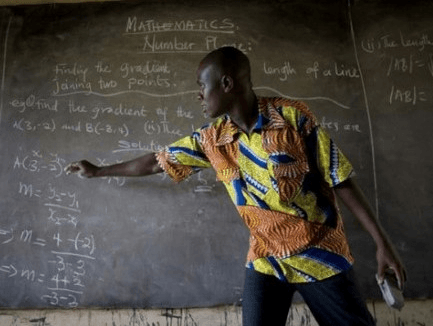
Government’s investment in educational infrastructure especially in rural communities has been a subject of concern in recent times.
The non-existence of accommodation facilities in deprived communities has compelled many teachers to leave schools in deprived districts creating huge deficits.
The Gadorkope school in the Kwahu Afram Plains South District in the Eastern Region is currently faced with same situation as teachers posted to the school struggle for decent accommodation.

Education is a powerful tool to shape the world
However, in Ghana, teachers who are major stakeholders in education go through difficult times to deliver tuition services to pupils.
Teachers posted to schools in hinterland communities mostly become stranded and eventually retreat because there are no accommodation facilities for them. That is the situation Abdulai Seidu is confronted with.
Seidu a resident of Tamale, was posted to Gadorkope a semi-island community three years ago after the Ghana Education Service realized that his service is needed by the community for the revival of the public basic school there.

Seidu became the only teacher in the school handling six classes for more than a year.
His energy was drained in the quest to professionally execute his passion, but the non-availability of accommodation for him nearly caused him to abandon post.
After days of sleeping in a church, a resident sacrificed his room for Seidu to be accommodated.

At Gadorkope, houses are built according to family sizes so, there are no surpluses to meet the accommodation needs of other people outside of the family circle.
The accommodation Seidu now inhabits has developed defects in the walls while the thatch roofing has perforations.

The rainy season presents a difficult situation of sleepless nights for Seidu following the leakage of the thatch roof.
Scorpions also frequent his abode. A second teacher posted to Gadorkope to complement teaching efforts last year retreated because there was no accommodation facility for him after lurking around for a week.
The workload coupled with the discomforting accommodation situation turn to weigh down on Seidu’s passion.
Back in class, teaching and learning are done under harsh conditions. Furniture are non-existent in multi-grade held classrooms limiting the performance of academic works on the floor.

Broken pieces of furniture supported by cement blocks serve classes three and four pupils in first come, first serve fashion.
Seidu’s new colleague, Rhoda from the Central Region accepted to teach at Gadorkope after her husband was transferred there for evangelism.
She is already overwhelmed by the plight of teachers in rural communities.
“There is no furniture in the classrooms so sometimes I sit on the floor with the children. Even when you are sick, you are forced to come to school to teach,” Rhoda lamented.
She added that, ”the accommodation situation for teachers in this community is very bad. I feel very sad because bats will be flying in and out.”
The situation is widespread in the country. It is clear that government’s investment in educational infrastructure, especially in schools in underserved communities must be relooked at as the prevailing situations there do not foster good environment to enable teachers give off their best.
Currently, the Kwahu Afram Plains North and South districts has recorded teacher deficit of over one thousand five hundred.
The Ghana National Association of Teachers (GNAT) wants investment in educational infrastructure, especially in rural communities to sustain teachers’ interest in schools in hinterlands for improved learning outcomes.
The post The effects of poor accommodation for teachers in rural communities on education first appeared on 3News.
Read Full Story













Facebook
Twitter
Pinterest
Instagram
Google+
YouTube
LinkedIn
RSS